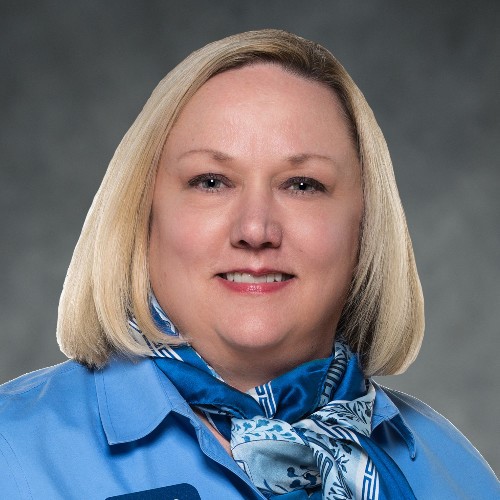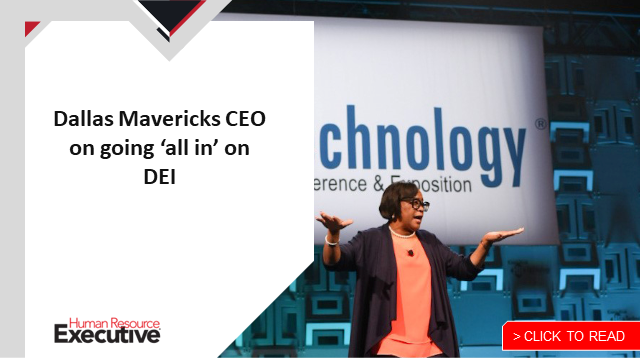Laura Andress has worked at Arvest Bank for more than 18 years. After more than a dozen years as an employment attorney, she joined the bank—the second-largest based in Arkansas—as director of group HR in 2004, went on to become executive director of group HR and, in 2019, assumed the chief people officer position. Her lengthy tenure with the organization is not out of the ordinary—43% of employees have been with Arvest for more than a decade.
Many factors fuel that statistic, Andress says—including a people-focused culture, the company’s willingness to adapt and innovate, and an investment in employees, particularly through upskilling and reskilling. Andress recently shared with HRE more about why she and so many of the company’s more than 6,600 employees stick around.
HRE: How do you think your background as an employment lawyer influences how you approach HR?
Andress: Being an employment lawyer for about 10 years helped to give me a foundation for understanding the levels of equity that employers get involved in when it comes to their people. When I worked with clients across many different industries, I saw some were more invested than others in their associates. That’s what drew me to Arvest; the company is dedicated to the long-term growth of its people. I’ve seen how different people do it and that shapes your vision of what’s possible.

HRE: What have been some of the biggest shifts in people strategy that have happened during your time at Arvest Bank?
Andress: Twenty years ago, it was very personnel-oriented but now we’re very much a strategic partner with the C-suite—being part of that team, really understanding the strategy and where we’re trying to get to and how we can bring our people along. Most recently, that has been around the concept of remote work. We’ve seen our people be very productive and that [remote work] has bolstered work/life balance in ways that are so meaningful to so many people—in some cases, even more than pay. We’ve always talked a lot about work and then life, and now it’s just life. How does work play into your life and how can we support you through the course of your life? We’ve got more than 60% of our people working either fully remote or some form of remote and on-premises; that has changed dramatically since the start of 2020. And we’ve seen it really work. I actually work remote part-time.
HRE: Arvest has heightened the focus on upskilling and reskilling—what is driving that, and what kind of response have you seen from employees?
Andress: Training has always been important but, with the speed of transformation increasing and jobs changing so rapidly, it requires an intentional investment in our associates. We want to help them be growth-minded and grow their skills in ways that interest them—so they can have a long-term career at Arvest, as opposed to us continually hiring from a narrow pool of external talent. We want our employees to have the advantage of educational opportunities to help them embrace an ongoing growth mindset. If they thrive with the company, we can continue to meet our customers’ needs—because both are changing dramatically.
HRE: How are current events driving the company’s people strategy, particularly when it comes to retention?
Andress: During the pandemic, we saw a lot of companies make some hard decisions to maintain earnings. Luckily, Arvest is a private company so we have more control over those decisions. We didn’t cut any benefits, such as profit-sharing bonuses, 401(k) contributions, profit-sharing retirement benefits. We made a commitment to support our team in times of hardship, just as we did to our communities and our customers. Now with inflation, we’ve been implementing pay programs to address the pressure inflation causes as well as programs like remote work—to help cut costs associates may be dealing with. Part of what leads our employees to have such high tenure is that they understand we’re there to be with them through thick and thin.
HRE: What is at the heart of Arvest’s company culture, and has the pandemic impacted that in any way?
Andress: I would say it just made us stronger in terms of our culture. I was speaking to a new hire this morning and they were talking about how they’re already feeling how our culture is tangible. At the heart is three core values that relate to our mission. We want to communicate openly, and that is founded in respecting all individuals. Striving for excellence—trying our best for our teammates and customers every day. Then we recently adopted a new core value: drive change, which really helps our associates understand that innovation brings stability and opportunities. When we saw how the pandemic changed everything, we understood that we needed to change too to support our customers, our associates and our communities.
HRE: What are you passionate about outside of work?
Andress: My primary passion is music. I love the creativity in all kinds of different music. To me, it provides an instant window into the soul of a culture. You get to learn so many things about other people just by sharing music with them. I’ve played piano and I’ve tried drums and am OK at that. I tried guitar and was really bad, and tried flute back in the day and I’m not good at that either! I’m also really passionate about—especially in this time of strife and dissension—going out every day and trying to improve the lives of people around me. Like I tell my kids, be passionate about what you believe in and go and do that.
The post Nearly half of this bank’s workers are long-term employees. Here’s why appeared first on HR Executive.